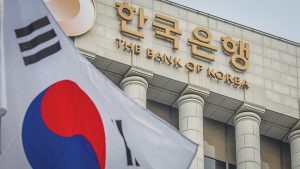Bloomberg
The Bank of Korea (BOK) is set to pivot back to an outsized interest-rate increase as it seeks to keep pace with the Federal Reserve and rein in inflationary pressures exacerbated by a weaker currency.
The central bank will raise its key rate by a larger-than-regular 50 basis points to 3% at Wednesday’s meeting despite having dialled back its pace of tightening in August, according to 16 of 19 economists surveyed.
A return to the pace of half percentage-point hikes seen in July would demonstrate the BOK’s resolve to rein in inflation and stop a weaker currency amplifying price increases even at the risk of slower growth. In contrast, Australia went the other way last week when it downshifted to a quarter-point move as it sought to balance fighting inflation with protecting the economy.
The urgency in South Korea for an outsized hike comes as its currency has depreciated at the fastest pace in Asia in recent months, further fueling inflationary pressures in an economy that relies heavily on imported raw materials and food.
The Bank of Korea left some room for moderation, saying the pace of tightening would depend on the monetary policies of other countries, Russia’s war on Ukraine and other offshore factors — and their impact on Korea’s economy.
“If the BOK continues to hike at smaller clips of, say, 25bps and does not take a big step, the interest rate gap with the US would widen and likely further weaken the Korean won,†said Kim Jin-wook, an analyst at Citigroup Inc.
The won is hovering around its lowest level in 13 years, raising fears it may weaken further if policymakers fail to shore up the currency at a time when it is also under pressure from snowballing trade deficits.
In a parliamentary hearing last month, Governor Rhee Chang-yong said he was surprised by the Fed’s willingness to take its terminal rate higher than previously expected, adding that this would impact the BOK’s decisions.
In a separate report to parliament on Friday, the BOK said it would keep lifting rates to contain inflation expectations that, if allowed to become untethered, could prolong price gains.
Still, the BOK left some room for moderation, saying the pace of tightening would depend on the monetary policies of other countries, Russia’s war on Ukraine and other offshore factors — and their impact on Korea’s economy.
That sense of caution reflects concerns about record household debt that threatens to curb consumption as rates climb. The BOK provided some support to the bond market, through which higher rates are partly transferred to consumers, by purchasing several trillion won of government debt in recent weeks.
Other factors clouding the outlook for the remainder of the year include a slowdown in exports and declining business confidence. Weakness is also spreading through the property market, adding to risks around household debt.
Nomura Holdings Inc. reckons the economy tipped into recession last quarter and Citigroup also sees a mild recession in the second half of this year.
 The Gulf Time Newspaper One of the finest business newspapers in the UAE brought to you by our professional writers and editors.
The Gulf Time Newspaper One of the finest business newspapers in the UAE brought to you by our professional writers and editors.
